Resources
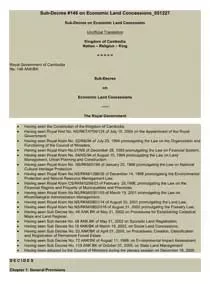
Sub-Decree 146 on Economic Land Concessions
The objectives of this sub-decree are to determine the criteria, procedures, mechanisms and institutional arrangements for initiating and granting new economic land concessions; for monitoring the performance of all economic land concession contracts; and for reviewing economic land concessions entered into prior to the effective date of this sub decree for compliance with the Land Law of 2001. This version is an unofficial translation.
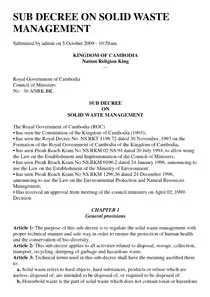
Sub-Decree on Control of Air Pollution
The purpose of this sub-decree is to protect the quality of the environment quality and public health from air pollutants and noise disturbance through monitoring, curbing and mitigating activities.
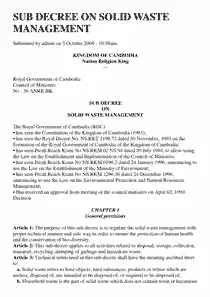
Sub-Decree on Solid Waste Management
The purpose of this sub-decree is to regulate the solid waste management with proper technical manner and safe way in order to ensure the protection of human health and the conservation of bio-diversity.
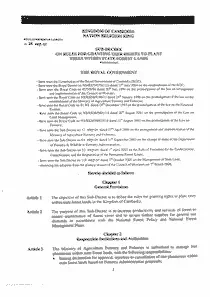
Sub-Decree on Rules for Granting User Rights to Plant Trees within State Forest Lands
The objective of this Sub-Decree is to define the rules for granting rights to plant trees within state forest lands in the Kingdom of Cambodia.
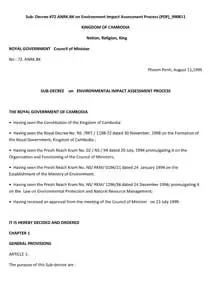
Sub-decree 72 on Environmental Impact Assessment Process
The purpose of this Sub-decree are an environmental impact assessment (EIA) shall be done on every project and activity, private or public, and shall be reviewed by the Ministry of Environment before being submitted to the Royal Government for decision.
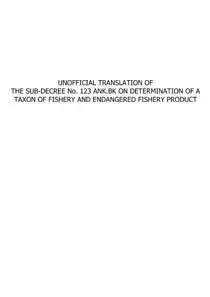
Sub-Decree on Determination of a Taxon of Fishery and Endangered Fishery Product
This Sub-Decree determines a taxon of inland and marine fisheries and fisheries products that are taken from endangered fishery resources in the Kingdom of Cambodia for sustainable protection, management and conservation in compliance with the law on fisheries. This is is the translated version.
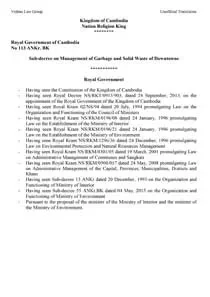
Sub-decree on Management of Garbage and Solid Waste of Downtowns
The goal of this sub-decree is to enhance the management of garbage and solid waste of downtowns with effectiveness, transparency and accountability, referring to ensure aesthetics, public health and environmental protection. This is is the translated version.
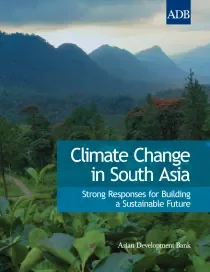
ADB Climate Change in South Asia
ADB's South Asia region is comprised of Bangladesh, Bhutan, India, the Maldives, Nepal, and Sri Lanka, extending from the highlands of the Himalayas to the atolls of the Indian Ocean. It is also home to more than 600 million of the world's absolute poor, who will be most vulnerable to the negative impacts of climate change. As critical sectors such as water, energy, and agriculture are affected, efforts at poverty alleviation and economic development are also threatened.
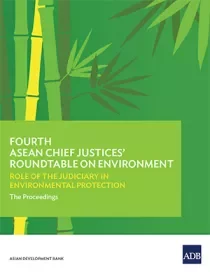
Fourth ASEAN Chief Justices' Roundtable on Environment: Role of the Judiciary in Environmental Protection. The Proceedings
The Hanoi Action Plan to Implement the Jakarta Common Vision signifies the Southeast Asian chief justices and senior judges' continuing commitment to promote environmental justice and strengthen the environmental law enforcement chain.
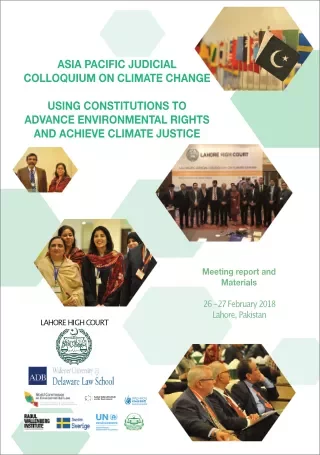
Asia Pacific Judicial Colloquium on Climate Change - Using Constitutions to Advance Environmental Rights and Achieve Climate Justice: Meeting Report and Materials
On 26 and 27 February 2018, the Asia Pacific Judicial Colloquium on Climate Change: Using Constitutions to advance Environmental Rights and Achieve Climate Justice was held in Lahore, Pakistan. The objective of this report is to give an overview of the colloquium and to provide training materials to help judges navigate through complex issues to achieve environmental, climate and social justice. The report includes the Lahore Action Plan, summaries of some speaker presentations, and provides a synopsis of environmental constitutionalism and selected landmark judicial decisions.